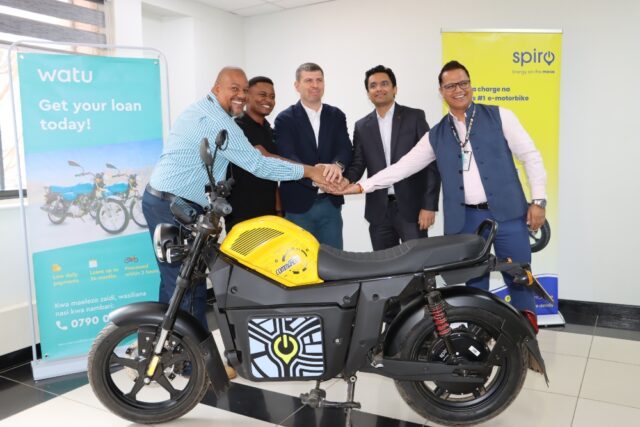Asset financing company Watu Credit (Watu) and Spiro, a pioneer in sustainable urban mobility solutions, have announced a partnership to improve access to affordable financing for electric motorbikes in Kenya.
Spiro has set up its headquarters in Mombasa and is one of the leading electric two-wheeler manufacturers in Africa with a presence in Kenya, Benin, Togo, Rwanda and Uganda.
Speaking during the announcement, Erick Massawe, Kenya Country Manager, Watu said:
“Through this partnership, we will leverage our dealership network to make Spiro electric bikes accessible to customers through affordable financing starting in Mombasa. We plan to further expand across a network of over 300 dealers countrywide, expanding the EV market in Kenya.”
‘’Our motorbikes have been very well received in Mombasa, and the demand has exceeded expectations,’’ says Mr. Kshitij Sharma, Managing Director, Spiro Kenya, ‘’Our bikes are popular not only due to the alternative solution we offer as fuel prices go higher but also because of the work we have put in research and development to make sure they are relevant to the African market.
The bikes are environmentally friendly and require minimal maintenance, which makes them very popular with riders as they try and minimise the costs of running their two-wheeled vehicles.’’
The firm has established a network of automated battery swap stations in Mombasa and is in the process of doing the same in Nairobi to meet the anticipated demand for affordable electric bikes.
The initial cash retail price of the Spiro EV motorcycle will be Kshs 195,000 and Ksh 196,700 for customers who will need Watu to manage logbook transfers for ownership. For those buying on credit, a Kshs 20,000 down payment is required with daily payments starting from Ksh 455, and the final cost of the asset being determined by the loan payment timeframe.
“Our partnership with Watu will ensure that we enable riders to access the motorbikes at an affordable rate and that way we will both contribute to supporting the government’s goal of transforming the transport sector with clean and affordable mobility. Partnering with them ensures that all riders can pay a daily fee similar to the cost of financing a petrol motorbike.,”
Mr. Sharma added.
The partnership with Watu will ensure that potential buyers of Spiro electric bikes have quick access to a flexible financing solution that makes owning an electric motorbike more accessible. This approach tackles the financial barriers that may otherwise hinder riders from embracing the benefits of electric mobility.
Mr. Sharma said that the agreement adds another step towards their goal of enabling universal access to affordable and clean transportation.
“The benefits of electric bikes are many and we want to make them affordable for people to own. They have far less maintenance and operational costs compared to fuel-powered versions, making them more economical. Additionally, our bikes are designed and made to cater to the specific needs of our customers, and we will also manage the set-up of charging infrastructure to manage range anxiety, ”
he added.
Mr. Massawe expressed confidence in the partnership, stating,
“We believe the future of the mobility industry is electric. Through our collaboration with Spiro, we will play a role in making electric motorbikes more accessible to riders in Kenya and eventually in Africa, and help in improving access and affordability.’’
Because of their zero carbon emissions, electric vehicles are a more sustainable and environmentally friendly form of transportation. According to the National Climate Change Action Plan 2018–2022, the transport sector’s share of the nation’s overall greenhouse gas (GHG) emissions in 2015 was about 13 percent. Due to consistent sector growth, this percentage is expected to rise to 17 percent by 2030. To meet Kenya’s Nationally Determined Contribution (NDC) target of reducing GreenHouse Gas (GHG) emissions by 32% by 2030, the adoption of electric vehicles by the sector has been encouraged.
Last year, Kenya launched an initiative to encourage the acceleration of e-mobility adoption so as to empower youth, lower the cost of operation for the boda boda sector, and position the country as a front-runner on the e-mobility journey.
Last year, Spiro announced that it would set up an electric motorcycle manufacturing and assembly plant at the Dogo Kundu Special Economic Zone in Mombasa, once it is operational. The plant will have the capacity to manufacture more than 1,000 motorcycles a day for distribution and sale across the African continent.




